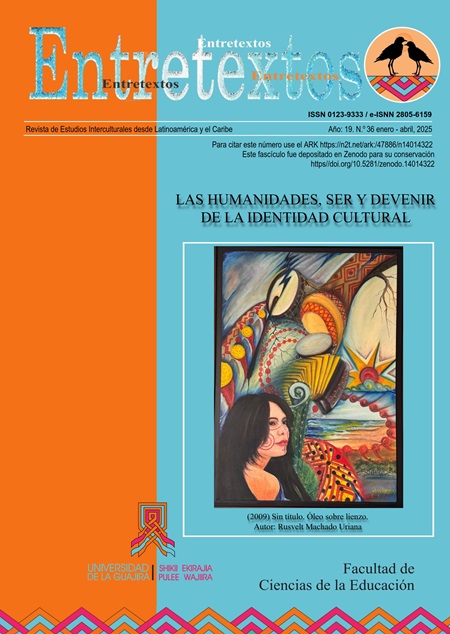Abstract
This article aims to address the theoretical-methodological referents that support the conception of the lexicon as a conducive axis in the productive processes: comprehension, analysis and textual construction, from neuroeducation, in the teaching-learning processes, for which the relationship between brain functioning and its intersection in the act of lexical learning in terms of the development of lexical competence at school is assumed. It specifies the importance of knowing the process of attention and its neuronal mechanisms to understand the processes of learning, memory, and acquisition of knowledge and emphasizes the theoretical- methodological aspects such as preparation of teachers for the teaching-learning of the processes of interpretation and construction of different textual typologies, taking into account their specific lexicon and metaphorical constructions from the cognitive and linguistic point of view.
References
Bartol-Hernández, J.A. (2010). “Disponibilidad léxica y selección del vocabulario” En Rosa María Castañer Martín & Vicente Lagüens Gracia (eds.). De moneda nunca usada. Estudios dedicados a José María Enguita Utrilla; Z. Ed. Institución Fernando el católico. 603 págs.
Bartol-Hernández, J.A. (2021). Reflexiones sobre la enseñanza del léxico. Conferencia magistral dictada en el VIII Taller internacional "La enseñanza de las disciplinas humanísticas". Universidad de Matanzas.
Bernabeu-Tarí, G. (2023). “¿Qué opina el profesorado de la especialización en neuroeducación?”.RevDisCliNeuro; 10(1), 25-38. https://doi.org/10.14198/DCN.25195
Carriscondo-Esquivel, F. M. (2006). Creatividad léxica-semántica y diccionario: cinco estudios. Santiago de Compostela, España. Ed. Universidad de Santiago de Compostela. 100 Págs.
Codina-Felip, M. J. (2014). “Neuroeducación: reflexiones sobre neurociencia, filosofía y educación”. Postconvencionales: ética, universidad, democracia, (7-8), 164-181.
De Miguel-Aparicio, E. (ed.). (2009). Panorama de lexicología. Barcelona, Ariel. Págs. 528.
Hickok, G. & Poeppel, D. (2007). “The cortical organization of speech processing”. Nature Reviews Neuroscience. May, 8(5).
Igoa, J. M. (2009). “El procesamiento del léxico”. En Panorama de la lexicología De Miguel, E Barcelona, Ariel. Págs. 405-434.
Lakoff, G. & Johnson, M. (1986). Las metáforas de la vida cotidiana. Madrid, Ed. Cátedra.
Lamus de Rodríguez T, Moreira-Choez J & Castro-Castillo G. (enero abril 2023). “Propuesta de formación docente para incentivo de la resiliencia, la neurociencia afectiva y cognición social de alumnos que estudian en pandemia”. Uisrael – vol. (10) núm. 1.
Loor-Llanos, L., & Torrealba-Peña, M. (2023). “Fenomenología sobre la neuroeducación en el subnivel de preparatoria: concepciones del profesorado”. Ciencia y Educación, 7(2), 23–36.
Mondéjar-Rodríguez, J., Rodríguez-Fuentes, A. & Fierro-Chong, B. M. (2023). El paradigma de apoyos al aprendizaje desde la neurodidáctica: una necesidad desde la formación universitaria. Revista Entretextos 17 (33), 90-108 doi: 10.5281/zenodo.8218195
Observatorio Innedu. ¿Por qué es importante aplicar la neurodidáctica en el aula? Recuperado de:
http://www.innedu.es/importante-aplicar-la-neurodidactica-aula/#.WWzTw4jyjIV
Oramas-Díaz, M. M. (2012). “Enseñar lengua es enseñar léxico”. Revista Órbita Científica. 18, (67). p. 6
Oramas-Díaz, M. & Chávez-Gallegos, T. (2020). “El léxico. La cohesión léxica en la interpretación y las construcciones textuales”. En Cultura y Comunicación: transdisciplinariedad textual, Ávila González, Iván. (2020). México, Morevalladolid.
Perdomo-Casanova, N. (2021). El desarrollo del léxico de los estudiantes de la carrera Periodismo (Tesis en opción al Grado de Doctor en Ciencias de la Educación), Universidad de Matanzas.
Pustejovsky, J. (1995). El léxico generativo. E.U.A., Ed. Instituto Tecnológico de Massachusetts.
Roméu-Escobar, A. J. (2007). Enfoque cognitivo, comunicativo y sociocultural en la enseñanza de la Lengua y la Literatura. La Habana, Cuba: Pueblo y Educación.
Tokuhama-Espinosa, T. N. (2013). The new science of teaching and learning: Using the best of mind, Brain and Education Sciencie in the classroom. Nueva York, Estados Unidos: Columbia University
Wotjak, Gerd. (2006) ¿Estructuras en el léxico o del léxico? Alemania: Peter Lang. Teachers College Press.
Zaro, M., Menezes, R., Ribeiro, L., Spindola, M., Ponzio, A., Bonini-Rocha, A., & Timm, M. (2010).“Emergência da Neuroeducação: a hora e a vez da neurociência para agregar valor à pesquisa educacional”. Ciências & Cognição, 15 (1), 199-210.

This work is licensed under a Creative Commons Attribution-NonCommercial-NoDerivatives 4.0 International License.


